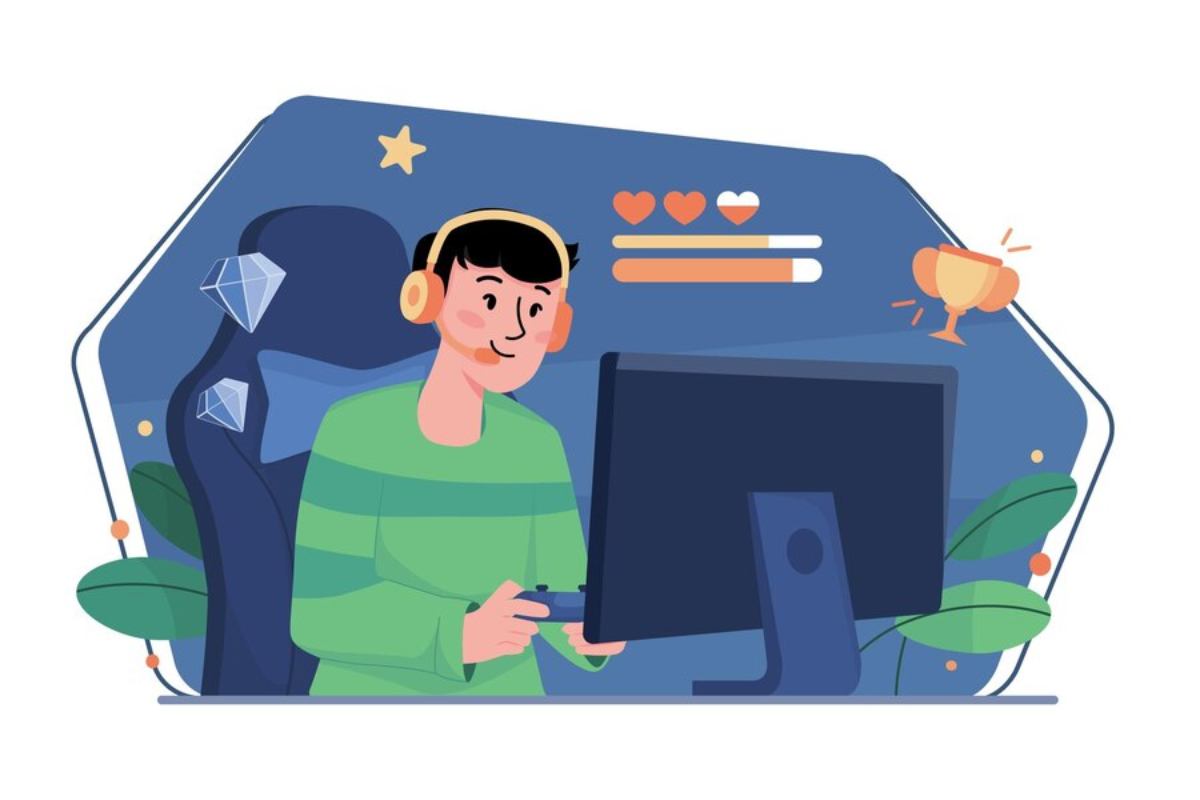Blog
5 Habits of Highly Skilled Gamers You Can Adopt Today

Are you looking to take your gaming to the next level? Whether you’re a casual player or an aspiring esports pro, adopting the habits of highly skilled gamers can supercharge your performance and enjoyment. Through 5 key habits that top gamers swear by – and show you how to put them into practice today.
Habit 1: Develop a Consistent Practice Routine
All the best gamers have one thing in common – they practice purposefully. Putting in focused training time is essential for building muscle memory, improving mechanics, and ingraining good habits. Here’s how to develop an effective practice routine:
- Schedule dedicated practice blocks. Aim for at least an hour daily, 3-5 times weekly. Consistency is key.
- Focus each session on 1-2 specific skills or techniques you want to improve. Don’t just play mindlessly.
- Use tools like aim trainers, replay analysis, or coaching to accelerate your improvement.
- Track your progress over time to stay motivated. Celebrate improvement milestones!
Examples of Focused Practice Drills
- For FPS games: Spend 30 mins in an aim trainer working on flick shots and tracking. Then, 30 minutes in the game, focusing only on crosshair placement.
- For MOBAs: Last hit drills to perfect your CSing. Skillshot practice with bots. Reviewing your map awareness in replays.
- For fighting games: Practice hit confirms for each character. Drill your brutal combos until you can do them consistently. Work on reaction times in training mode.
Tips to Stay Motivated
- Remind yourself why you’re practicing – to get better! Compare your gameplay to old VODs to see how far you’ve come.
- Make practice rewarding and fun. Listen to music, practice with friends, and give yourself mini challenges.
- Take breaks to avoid burnout. Your improvement happens during rest and recovery. Please don’t overdo it.
- Remember, everybody starts somewhere. It’s not about being perfect; it’s about getting a little better each day.
“We are what we repeatedly do. Excellence is not an act, but a habit.” – Will Durant. Developing a consistent practice routine is the foundation upon which all your gaming skills will be built. Stick with it, and you will improve.
Habit 2: Learn the Fundamentals Inside Out
You can’t run before you walk. And in gaming, you can’t get fancy with advanced tactics until you nail the basics. The best players have completely mastered the fundamentals of their game. Do you know yours?
- Study your game’s core mechanics. Movement, aim, economy, objectives, etc. You should know these by heart.
- Learn the rules, maps, characters, items, and interactions. The more game knowledge you have, the better your decision-making will be.
- Practice tool-assisted speedruns (TAS) or challenges that uniquely force you to interact with the game’s mechanics. You’ll gain a whole new appreciation for your game’s physics and systems.
Examples of Studying Fundamentals
- For Rocket League: Practice dribbling obstacle courses. Spend hours in free play working on your car and ball control. Learn the dodge and flip timings perfectly.
- For Starcraft: Master your build orders. Know every unit’s counters and interactions. Practice microing individual unit types until it’s second nature.
- For Street Fighter: Learn the frame data for every move. Know your optimal punishes. Practice hit confirms and whiff punishing until it’s instinct.
Tips for Expanding Game Knowledge
- Read your game’s wiki or patch notes. Stay up to date on changes and interactions.
- Watch educational content from top players and coaches. Learn from their thought processes and insights.
- Analyze your replays to find holes in your knowledge. What interactions surprised you? What didn’t work as expected? Fill those gaps.
- Discuss the game with skilled friends or online communities. You can learn a lot from others’ experiences and ideas.
Build your gaming knowledge brick by brick. Once you completely understand how the game works on a fundamental level, you can improvise and solve problems on the fly. And that’s when the real fun begins.
Habit 3: Optimize Your Settings and Gear
You wouldn’t bring a knife to a gunfight. To play your best, you must equip yourself with the right tools for the job. Highly skilled gamers ensure their in-game settings and gaming gear are on point.
- Experiment with different in-game settings. Sensitivities, crosshairs, graphics, keybinds, etc. Find what works best for you.
- Invest in quality gaming gear. A good monitor, mouse, keyboard, and headset can make a huge difference. You don’t need the most expensive options but don’t cheap them out.
- Make sure your setup is comfortable and ergonomic. You want to play for extended sessions without hurting your hands, wrists, back, or eyes.
Examples of Optimizing Settings
- For Overwatch: Experiment with different crosshair settings and sizes until you find one that helps you aim best. Adjust graphics settings to maximize FPS without sacrificing visibility.
- For Fortnite: Find the perfect mouse sensitivity that balances building and aiming. Customize keybinds to make building and editing fast and fluid.
- For Dota 2: Adjust your minimap and HUD to give maximum information with minimal clutter. Dial in your hotkey setup for items and control groups.
Tips for Choosing Gear
- Read online reviews and comparisons. Look for options with good build quality, performance, and value.
- Try before you buy. Go to a store to get a feel for mice, keyboards, and headsets in your hands.
- It is favored wired over wireless for lower latency and no battery life issues. However, high-end wireless technology has improved a lot recently,
- Look for sales and discounts. You can often get great deals if you’re patient and shop around.
The proper setup can make a night and day difference in your gameplay. It won’t automatically make you a pro but removes barriers and helps you play to your full potential. One less thing to worry about.
Habit 4: Master the Art of Communication
“But I’m a solo queue god,” you say. Sure, mechanical skills can take you far. But you know what separates decent players from great ones? Communication skills. The top gamers are masters of teamwork and shotcalling.
- Work on your awareness and information gathering. The more you know about the state of the game, the better you can help your team.
- Practice concise, clear callouts. Communicate the most important information efficiently. No cluttering comms with useless chatter.
- Learn how to be a leader. Take charge in guiding your team’s strategy and decisions. Make suggestions, not demands.
- Stay positive and constructive. Don’t tilt your team with negativity or blame. Focus on what you can do better next time.
Examples of Great Communication
- In CSGO: “One enemy low back site.” “I’m flashing high, go go go.” “Save this round; let’s buy together next.”
- In League: “Drake is spawning in 1 minute. Let’s set up vision.” “Top has no flash; let’s gank him.” “Wait for my ult before engaging.”
- In Overwatch: “Reaper flanking behind.” “Zarya has grav, spread out.” “I have beat, let’s fight this.”
Tips for Improving Comms
- Review your comms in VODs. Listen for what’s helpful and what’s not. Make a mental note to improve.
- Study shotcalling from high-level games. Listen to how the pros communicate and lead their teams.
- Practice callouts even when playing solo. Get in the habit of noting important info.
- Be a great listener, too. Communication is a two-way street. Make your teammates feel heard.
The days of the lone wolf gamer are over. All the top games these days are team-based. And in a team, communication is the key to victory. Work on those comms and be the shot-caller your team needs.
Habit 5: Develop a Strong Mental Game
Last but definitely not least – you need to develop mental toughness to perform at your highest level. Playing under pressure, bouncing back from a loss, and keeping your head in the game – are all skills that highly successful gamers have mastered.
- Learn strategies for managing tilt and frustration. Feeling those feelings is okay, but don’t let them tank your gameplay. Take a break, shake it off, and reset.
- Visualize success before high-stakes games. Imagine yourself playing cool, calm, and collected. Picture your strategies working perfectly. Your mind is your most powerful tool.
- Develop a growth mindset. Look at mistakes and losses as learning opportunities. Focus on constant improvement, not just short-term results.
- Take care of yourself outside the game. Get enough sleep, eat well, exercise, and spend time with loved ones. A balanced life will help you show up sharper in the game.
Examples of Strong Mental Games
- After a tough loss, a top player takes a few deep breaths, writes down what they want to improve, and starts the next game with a clean slate.
- Before an important match, a pro visualizes their game plan, imagines themselves outplaying the enemy, and repeats a mantra like “I’m at my best when the pressure is highest.”
- When going on a loss streak, instead of rage queueing and tanking their MMR, a brilliant player steps away to reset with some exercise, social time, or a good night’s sleep.
Tips for Building Mental Fortitude
- Study sports psychology techniques like visualization, self-talk, and routines. Apply them to your gaming.
- Meditate or practice mindfulness. Learn to observe your thoughts and emotions without getting lost in them.
- Reframe nerves and excitement. Those butterflies are your body getting ready to perform. Welcome them.
- Celebrate your successes along the way. Reflect on how far you’ve come and let yourself feel good about your hard work.
The mental game is often the difference-maker at the highest levels of competition. Two players might have equal mechanics, but the one with the stronger mindset will come out on top. It’s a long-term project but well worth the effort. The saying goes, “It’s 90% mental, 10% skill.”
By putting these five habits into practice – developing a routine, mastering fundamentals, optimizing your setup, leveling up communication, and training your mental game – you’ll be well on your way to the upper echelons of gaming. But remember, it’s a marathon, not a sprint. Consistent effort over time is what leads to mastery. So stay patient, stay focused, and most importantly – have fun! Happy gaming.
